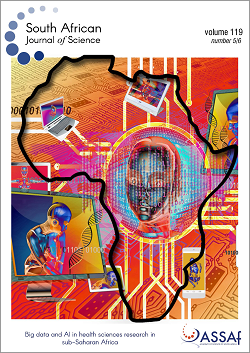Revealing human mobility trends during the SARS-CoV-2 pandemic in Nigeria via a data-driven approach
DOI:
https://doi.org/10.17159/sajs.2023/14727Keywords:
SARS-CoV-2, human mobility, trips, policy, NigeriaAbstract
We employed emerging smartphone-based location data and produced daily human mobility measurements using Nigeria as an application site. A data-driven analytical framework was developed for rigorously producing such measures using proven location intelligence and data-mining algorithms. Our study demonstrates the framework at the beginning of the SARS-CoV-2 pandemic and successfully quantifies human mobility patterns and trends in response to the unprecedented public health event. Another highlight of the paper is the assessment of the effectiveness of mobility-restricting policies as key lessons learned from the pandemic. We found that travel bans and federal lockdown policies failed to restrict trip-making behaviour, but had a significant impact on distance travelled. This paper contributes a first attempt to quantify daily human travel behaviour, such as trip-making behaviour and travelling distances, and how mobility-restricting policies took effect in sub-Saharan Africa during the pandemic. This study has the potential to enable a wide spectrum of quantitative studies on human mobility and health in sub-Saharan Africa using well-controlled, publicly available large data sets.
Significance:
- The mobility measurements in this study are new and have filled a major data gap in understanding the change in travel behaviour during the SARS-CoV-2 pandemic in Nigeria. These measurements are derived from high-quality data samples by state-of-the-art data-driven methodologies and could be further adopted by other quantitative research related to human mobility.
- Additionally, this study evaluates the impact of mobility-restricting policies and the heterogeneous effects of socio-economic and socio-demographic factors by a time-dependent random effect model on human mobility. The quantitative model provides a decision-making basis for the Nigerian government to provide travel-related guidance and make decisions in future public health events.
Open data set: https://github.com/villanova-transportation/Nigeria-mobility-COVID19-SAJS
Published
Issue
Section
License

All articles are published under a Creative Commons Attribution 4.0 International Licence
Copyright is retained by the authors. Readers are welcome to reproduce, share and adapt the content without permission provided the source is attributed.
Disclaimer: The publisher and editors accept no responsibility for statements made by the authors
How to Cite
- Abstract 600
- PDF 1032
- EPUB 480
- XML 520
Funding data
-
National Institutes of Health
Grant numbers U54TW012041-02












.png)